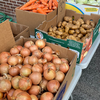Scrap-to-compost startup fills midcoast niche
 Photo / Maureen Milliken
Portland-based Garbage to Garden has the pickup contract for South Portland's 600-home pilot program. Since it was founded in 2012, the curbside compost service has steadily grown. It now serves more than 5,000 households, schools, restaurants, businesses and events throughout Maine and Massachusetts. A Camden startup called ScrapDogs Community Compost is launching a similar effort in the midcoast region, starting with a subscriber base of restaurants and households.
Photo / Maureen Milliken
Portland-based Garbage to Garden has the pickup contract for South Portland's 600-home pilot program. Since it was founded in 2012, the curbside compost service has steadily grown. It now serves more than 5,000 households, schools, restaurants, businesses and events throughout Maine and Massachusetts. A Camden startup called ScrapDogs Community Compost is launching a similar effort in the midcoast region, starting with a subscriber base of restaurants and households.
A Camden startup called ScrapDogs Community Compost is building a subscriber base of restaurants and households for its service of turning food waste into compost.
The PenBay Pilot reported that while the business started by Rockport native Davis Saltonstall and Tessa Rosenberry of New York is new the region, it’s a simple niche concept based on the under-utilization of an everyday product. Operations are expected to launch June 29.
According to the company’s website, about half of what Mainers send to the dump every year could be collected and turned into compost. Although it’s possible to compost on one’s own, the chemistry and logistics of backyard compost can be difficult to accomplish individually.
The pick-up service will start in Camden, Rockport, Rockland, Hope, Appleton, Lincolnville, Thomaston, Belfast and surrounding areas.
According to the company’s blog, after a month of searching for the right location, the company settled on a pilot site at the Garden Institute at 122 Mechanic St. in Camden.
The partners launched a crowdfunding campaign on indiegogo to cover some of their startup expenses. In 2015, the partners created an organization called Return Recycling to build zero-waste pathways for educational institutions, working with New York University for two years doing waste characterizations that involved digging through trash for data in common areas of the main academic building.
“Because roughly half of most municipal solid waste is organic, building compost programs is the lowest hanging fruit for most budding waste reduction programs,” the blog post says.
Food waste-to-compost
The food waste-to-compost movement is an ecologically focused trend that's helped spur the local food movement while also galvanizing the other end of the food chain: food waste disposal. Two such municipal pilot programs started in 2017.
Garbage to Garden picked up 20 tons of food scraps a day from southern Maine drop-off sites and residential subscribers, through a pickup contract for South Portland's 600-home pilot program, which began in May. The city's goal was to recycle 40% of its garbage by 2020 and the year-long program's purpose is to gauge the interest. And Scarborough ended a similar pick-up pilot program early, but continued the drop-off program. The benefit for towns is considered to be that the less garbage they have hauled away, the less they pay in trash disposal costs. The waste is taken to Benson's Farm in Gorham, where it's turned into compost.
And since mid-2013, Portland-based Agri-Cycle Energy has been delivering food waste collected in Maine, Massachusetts and New Hampshire as additional feedstock for the two 400,000-gallon anaerobic digesters operated by Exeter Agri-Energy, the company created by Adam Wintle and his siblings in 2011 to transform cow manure and other organics into bio-gas as a way of assuring the continuing financial security of their extended family's neighboring 1,000-milking cow Stonyvale Farm.









Comments